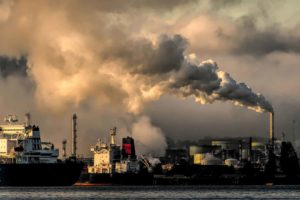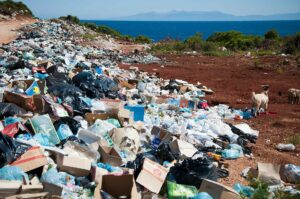What is the Anthropocene?
Have human beings caused permanent changes to the planet? This question has sparked discussions between environmental advocates and geologists regarding what to call the current period we live in. Officially, according to the International Union of Geological Sciences, we are in the Holocene epoch and have been for the past 11,700 years since the previous major ice age. However, many argue that this label is outdated. Given the extent of the impact that humankind has had on the planet including mass extinctions and alterations to the atmosphere, it is believed we have entered a new period. The term “Anthropocene” is formed of anthropo meaning “man” and cene meaning “new”.
 Paul Crutzen popularised the term in 2000, and it has since been increasing in appearance. Despite its increasing publicity, many are still opposed to the term. Stratigraphers study rock layers and argue that there is not enough evidence for a new epoch. Boundaries for geological time are defined by rock strata, and they believe the rock composition has not changed enough to define a new boundary. For example, the atomic era can be identified by traces of radiation in soils globally. Several scientists have proposed that the industrial revolution in the early 1800s should mark the beginning of the new epoch, the birth of the fossil fuel economy. Large-scale production was enabled by the burning of organic carbon in fossil fuels, driving the growth of factories, mills, and mines. As other countries followed suit, the demand for coal increased, coupled with the carbon dioxide emissions and the harm to the environment.
Paul Crutzen popularised the term in 2000, and it has since been increasing in appearance. Despite its increasing publicity, many are still opposed to the term. Stratigraphers study rock layers and argue that there is not enough evidence for a new epoch. Boundaries for geological time are defined by rock strata, and they believe the rock composition has not changed enough to define a new boundary. For example, the atomic era can be identified by traces of radiation in soils globally. Several scientists have proposed that the industrial revolution in the early 1800s should mark the beginning of the new epoch, the birth of the fossil fuel economy. Large-scale production was enabled by the burning of organic carbon in fossil fuels, driving the growth of factories, mills, and mines. As other countries followed suit, the demand for coal increased, coupled with the carbon dioxide emissions and the harm to the environment.
Signs of the Anthropocene
In the last 11,500 years, the Holocene has seen humans developing modern civilisations and building cities, alongside rapid population growth and achieving enormous technological advancements. Scientists agree that this increase in population and the anthropogenic activities that come with it are the primary cause of the accelerated global warming we are witnessing today.
 It is widely accepted that human beings have significantly impacted the Earth and the species encompassed within it having lasting and irreversible influences on the environment, biodiversity, and processes. The Earth is approximately 4.5 billion years old, and modern humans have been exploring the planet for only 200,000 years. If we were to condense Earth’s history into 24 hours, humans emerged at 11:58 pm. However, within this limited time frame, we have fundamentally altered the biological, physical, and chemical systems of Earth on which all its inhabitants depend.
It is widely accepted that human beings have significantly impacted the Earth and the species encompassed within it having lasting and irreversible influences on the environment, biodiversity, and processes. The Earth is approximately 4.5 billion years old, and modern humans have been exploring the planet for only 200,000 years. If we were to condense Earth’s history into 24 hours, humans emerged at 11:58 pm. However, within this limited time frame, we have fundamentally altered the biological, physical, and chemical systems of Earth on which all its inhabitants depend.
The past 60 years have been particularly destructive, with human impacts occurring at unprecedented rates and scales; these decades are often referred to as the Great Acceleration. From carbon dioxide emissions and global warming to ocean acidification and widescale natural resource extraction, the signs exist demonstrating that we have significantly modified our planet. For thousands of years, Earth’s climate has been relatively stable, but global warming is affecting polar regions and the far corners of our planet.
 Plastic could be used as a key marker of the Anthropocene epoch. As millions of tonnes of plastic is produced and discarded every year, the planet is covered in it. Plastic does not biodegrade, causing it to litter ocean beds and soils. A 2019 study found that plastic deposits in the fossil record have been increasing since the 1940s. Researchers have recently coined the term plastiglomerate for loose rocky structures composed of natural materials including coral, shells, basalt, sand, and woody debris, glued together by melted plastic. This novel rock is primarily found at beaches and ocean beds.
Plastic could be used as a key marker of the Anthropocene epoch. As millions of tonnes of plastic is produced and discarded every year, the planet is covered in it. Plastic does not biodegrade, causing it to litter ocean beds and soils. A 2019 study found that plastic deposits in the fossil record have been increasing since the 1940s. Researchers have recently coined the term plastiglomerate for loose rocky structures composed of natural materials including coral, shells, basalt, sand, and woody debris, glued together by melted plastic. This novel rock is primarily found at beaches and ocean beds.
This is the first time in history a single species has been responsible for a mass extinction event and causing such destructive effects to the natural world while having an awareness of doing so. Furthermore, the current extinctions we are experiencing are occurring at a significantly faster rate than they have for millions of years. Since the dawn of humankind, our planet has never been in such a critical state. However, we have also never been better equipped to fully understand the changes we are experiencing and act on them accordingly.






